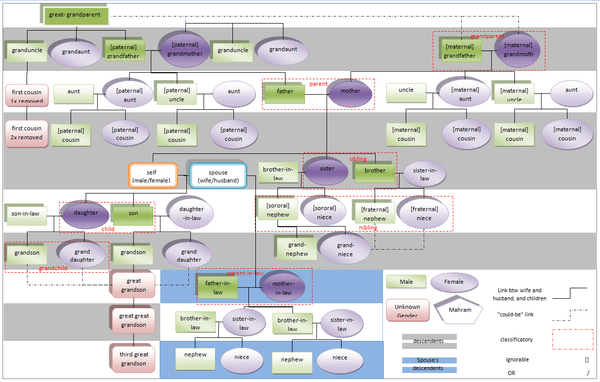Mahram
| Part of a series on |
| Islamic jurisprudence (fiqh) |
|---|
| Islamic studies |
In Islamic sharia legal terminology, a mahram (Arabic محرم, also transliterated mahrim or maharem) is an unmarriageable kin with whom sexual intercourse would be considered incestuous, a punishable taboo. Current usage of the term covers a wider range of people and mostly deals with hijab and its cultural and regional norms.
The plural form of the word in the Arabic language is maharim with long second vowel (Arabic محارم, also transliterated maharem). Sometimes the word is capitalized but there is not a general consensus that the word should be capitalized like Muslim. (The Arabic alphabet has no upper-case vs. lower-case distinction.)
Being mahram is a mutual condition. If A is mahram to B, B is definitely mahram to A.
Who is mahram?

Any relative that a Muslim is not allowed to marry is mahram, if they are of the opposite sex and have reached puberty. A partial list of what is considered a mahram can be found in Surah 24, Ayah 31, of the Koran.
A woman's male mahrams fall into four categories (three categories in the strict-sense definition that does not count one's spouse). Mahrams for a man can be derived in a similar manner.
- Permanent or blood mahrams with whom one is mahram by a blood relationship:
- parents, grandparents and further ancestors
- siblings
- children, grandchildren and further descendants
- siblings of parents, grandparents and further ancestors
- children and further descendants of siblings
- In-law mahrams with whom one becomes mahram by marrying someone:
- father-in-law, mother-in-law;
- son-in-law, daughter-in-law,
- stepfather (mother's husband) if their marriage is consummated, stepmother (father's wife) if their marriage is consummated;
- stepson (husband's son) if their marriage is consummated, stepdaughter (wife's daughter) if their marriage is consummated;
- Rada or "milk-suckling mahrams" with whom one becomes mahram because of being nursed by the same woman. When a woman acts as a wetnurse (that is she breast feeds an infant that is not her own child for a certain amount of time under certain conditions), she becomes the child's rada mother and everything concerning blood mahrams applies here, like rada father/mother, rada sister/brother, rada aunt/uncle and so on. In English these can be referred to as milk brother, milk-mother, and so on.
For a man, mahram women include his mother, grandmother, daughter, granddaughter, sister, aunt, grandaunt, niece, grandniece, his father's wife, his wife's daughter (step-daughter), his mother-in-law, his rada mother and any other rada relatives that correspond to the above-mentioned blood relatives. As the Prophet said, "What is forbidden by reason of kinship is forbidden by reason of suckling." (Al-Bukhari)
These are considered maharim because they are mentioned in the Koran:
"And marry not women whom your fathers married, except what has already passed; indeed it was shameful and most hateful, and an evil way. Forbidden to you (for marriage) are: your mothers, your daughters, your sisters, your father's sisters, your mother's sisters, your brother's daughters, your sister's daughters, your foster mother who gave you suck, your foster milk suckling sisters, your wives' mothers, your step-daughters under your guardianship, born of your wives to whom you have go in - but there is no sin on you if you have not gone in them (to marry their daughters), ... the wives of your sons who (spring) from your own loins, and two sisters in wedlock at the same time, except for what has already passed; verily, Allah is Oft-Forgiving, Most Merciful." (An-Nisa 4:22-23)
All of the man's female relatives mentioned in these two verses are considered his maharim, because it is unlawful (haram) for him to marry them, except the wife's sister mentioned last, who is not a mahram because he can marry her if he divorces her sister, or if his wife dies. As noted in the introduction, the notion of mahram is reciprocal. All other relatives are considered non-maharim and they fall under the category of strangers.
Some rules regarding mahrams and ghayr mahrams (non-mahrams)
- Theoretically, a Muslim woman's mahrams form the group of allowable escorts when she travels.
- An adopted brother (adopted sister) of a woman (man) is ghayr mahram to her (him) and they can marry each other. The term "adopted" means those children who are adopted by one's parents for the purpose of providing shelter and upbringing and who do not fall under the relationships outlined under the section "Who is mahram?" above.
- Except for the spouse, being mahram is a permanent condition. That means, for example, that a man will remain mahram to his ex-mother-in-law after divorcing her daughter. One is ghayr mahram to one's ex-spouse.
- One must not stay with a ghayr mahram in seclusion where none of their mahrams is present (see also proxemics).
- If wives of a man each become a rada mother of a child, all children and all rada mothers will be mahram to each other.
Notes
References
- The Quran, al-Baqara, 2:221
- Abdul-Rahman, Muhammad Saed, Islam: Questions and Answers - Jurisprudence and Islamic Rulings, London: MSA Publication Limited, 2007, pp. 22–23.
- Packard, Gwen K., Coping in an Interfaith Family, New York: Rosen Publishing Group, 1993, p. 11.
